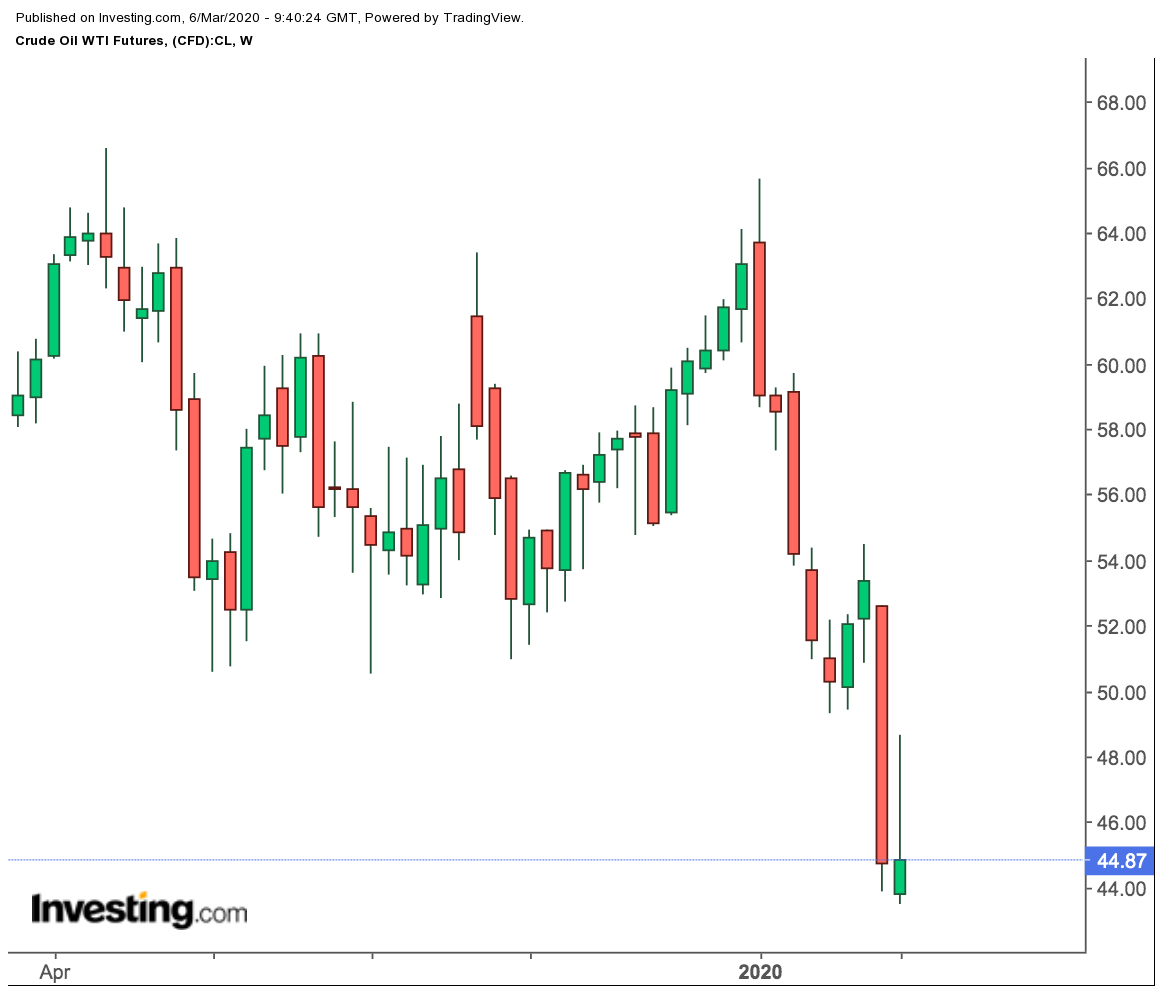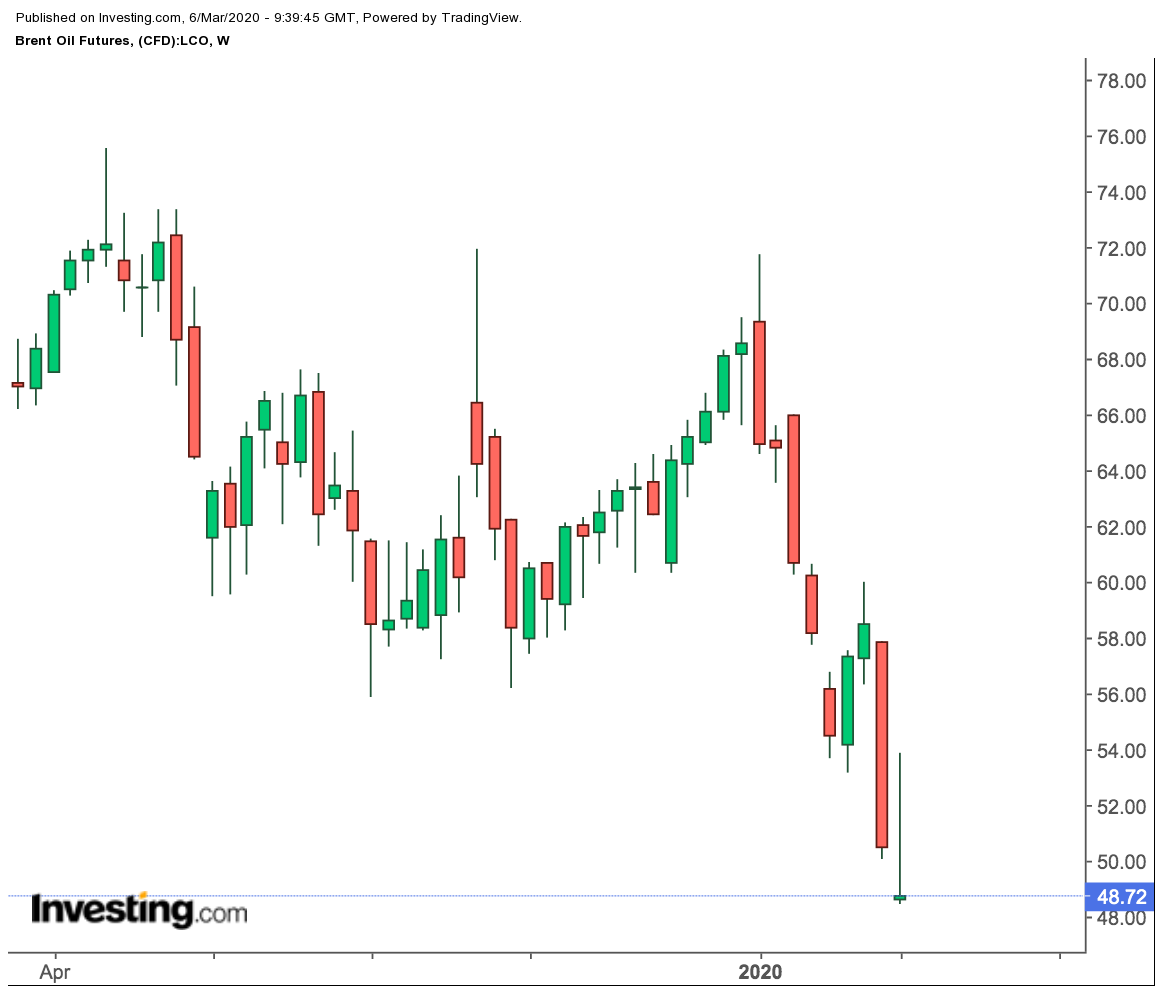Call it the oil market’s ultimate fight, but one where not a single punch will be thrown.
In the blue corner, weighing in with his flowing white robes, will be Abdulaziz bin Salman, Saudi Arabia’s Energy Minister, who already has one production cutting pact under his belt and is looking for another.
In the red corner, in his dapper suit, will be Alexander Novak, Russia’s Energy Minister, who will try to stay in the ring without giving in too much to his opponent. 
And as the bell sounds in the Austrian capital for the two heavyweights, the oil trading world in the audience will wonder where this match will leave them.
A Good or Bad Ending?
Fight analogy aside, what unfolds over the remaining hours of today at the OPEC+ showdown in Vienna could strengthen the global oil producing alliance to once again stare a crisis — the coronavirus — in the face and do the needful (output cuts) to survive.
Or it could leave the group without the support of Russia, its most important ally of the past five years, to face market forces so destructive they could put an end to its six-decade existence.
For those requiring an update on the narrative, here’s the short take: Ministers of the Organization of Petroleum Exporting Countries, led by Saudi Arabia’s Abdulaziz, are trying to force Russia’s Novak to join them in cutting as much as 1.5 million barrels per day from the global oil market to mitigate demand lost to the coronavirus crisis.
As Bloomberg observed in a report late on Thursday, only in July, Russia and Saudi Arabia hailed their alliance, known as OPEC+, as a marriage to “eternity.”
Fast forward less than a year, and the view among traders is that the couple may be on the verge of divorce, Bloomberg noted. It added a caveat though: “It’s not the first fight between Moscow and Riyadh, and both sides have been able to find a satisfactory solution in the past.”
But what if they don’t?
Then, the loser will be the entire universe of oil producing nations, and every company and individual associated with the industry — from behemoths like Saudi Aramco (SE:2222) and Exxon Mobil (NYSE:XOM) to small shale drillers in Texas, politically vulnerable African states like Nigeria and Libya and tiny but immensely wealthy nations like Brunei, which has virtually nothing to sell but oil.
Jeffrey Halley, senior market analyst at online trading platform OANDA, describes such a situation as “a disaster for oil, with Brent crude almost certainly falling to $30 to $35 a barrel in such a scenario.” The global crude benchmark settled just under $50 per barrel on Friday, its first close below that level in three years. For 2020 thus far, both Brent and U.S. West Texas Intermediate crude are down about 25% on the year
The Long, Hard Game
Rather than wishing damnation on OPEC+, Halley believes that Moscow is just playing the long, hard game with Riyadh before saying yes to the cuts, in order to get a deal where its contribution will just be a pittance compared to the Saudis.
Under the deal floated Thursday, the Saudis will provide most of the 1 million bpd for the deal while Moscow ponies up the balance half a million. Some say even that is too much for the Russians.
“I continue to believe that Russia is playing a rather ham-fisted negotiating ploy here,” OANDA’s Halley said in a note to Investing.com, adding that he “fully expects them to sign up” in the end.
Roger Diwan, a veteran OPEC watcher at consultant IHS Markit Ltd, agrees as much in comments reported by Bloomberg, noting that neither of the two oil titans could afford a price collapse. “This is a battle of egos against reality,” he said
Genuine Fear on Russians Part
Some say it’s more than egos — that it has to do with genuine fear on the Russians' part that the more they cut, the more U.S. shale drillers will be pumping and exporting to the world. And those exports will grab the market share given up by the Russians and Saudis in their zeal to achieve higher crude prices.
Since 2016, the Saudis and Russians have agreed to three production cut deals under OPEC+, reducing an average of one million bpd each time. In that time, the United States has become the world’s biggest oil producer, turning out a record high of 13.1 million bpd as of last week.
That’s not at all.
Shipments of U.S. crude are piercing the roof as well, making the country a net oil exporter for the first time in history and fulfilling the quest of an energy-independent America. Last week, exports reached more than 4 million bpd the first time since December, just four years after the previous Obama administration lifted a 40-year ban on crude shipments. Not surprisingly, the Russians, who’ve been in a cutting mode, don’t see the U.S. growth as a coincidence.
The Saudi Fault
Within OPEC’s inner circle, the Saudis have also been taking heat for their tendency to bend over backwards to accommodate Moscow. Novak, for instance, rebuffed the cuts proposed by Abdulaziz weeks before their Vienna meeting, despite Saudi King Salman personally getting on the phone with Russian President Vladimir Putin to discuss the matter first. And since Wednesday, Abdulaziz has been waiting for Novak to return to Vienna, with no certainty of what will happen after that.
All this has caused some OPEC members to stew, particularly Iran, which has criticized long-time rival Saudi Arabia for comprising the cartel’s sovereignty to a country that isn’t even a member. Some within OPEC also argue that the Kremlin has benefited much from the alliance, as the Saudis never took Russia to task for consistently producing more than they should under past deals.
Said John Kilduff, founding partner at New York energy hedge fund Again Capital:
“Putin and Co. have great deal. They just have to agree to what OPEC says, then produce whatever they want and enjoy the high prices that come as a result of the Saudi sacrifice.”
“But the U.S. shale drillers have it even better. They don’t have to cut a single barrel, yet they get price support from the efforts of the Saudis and Russians. And they get to take their markets too.”
